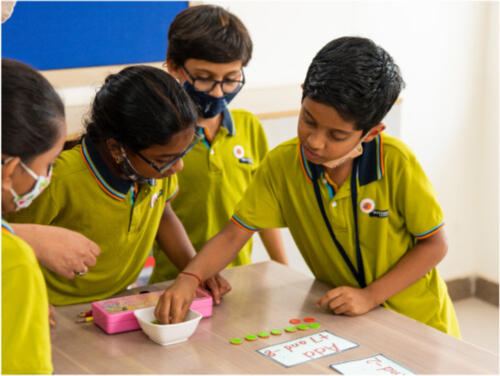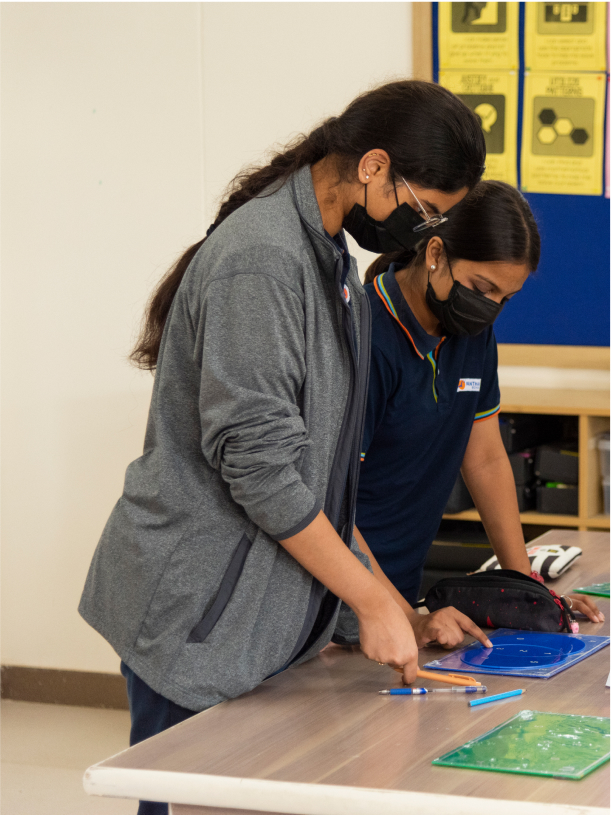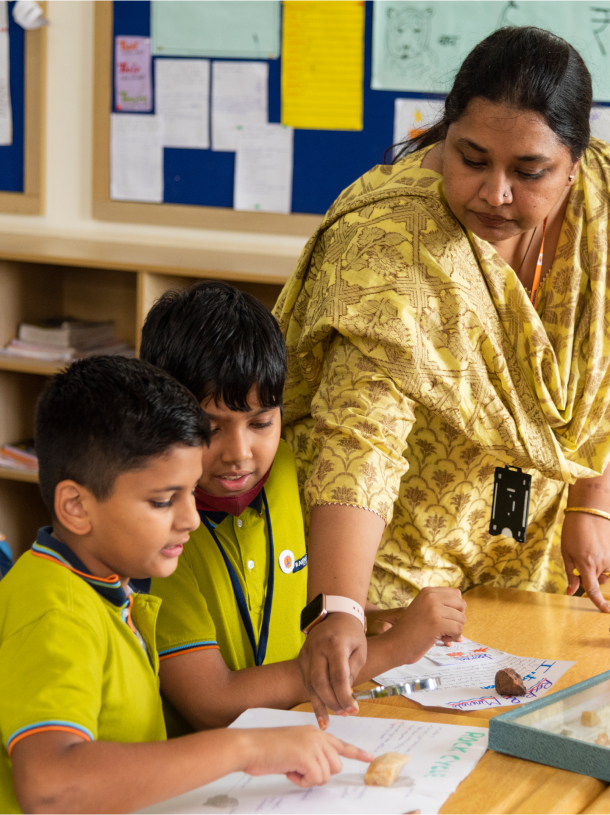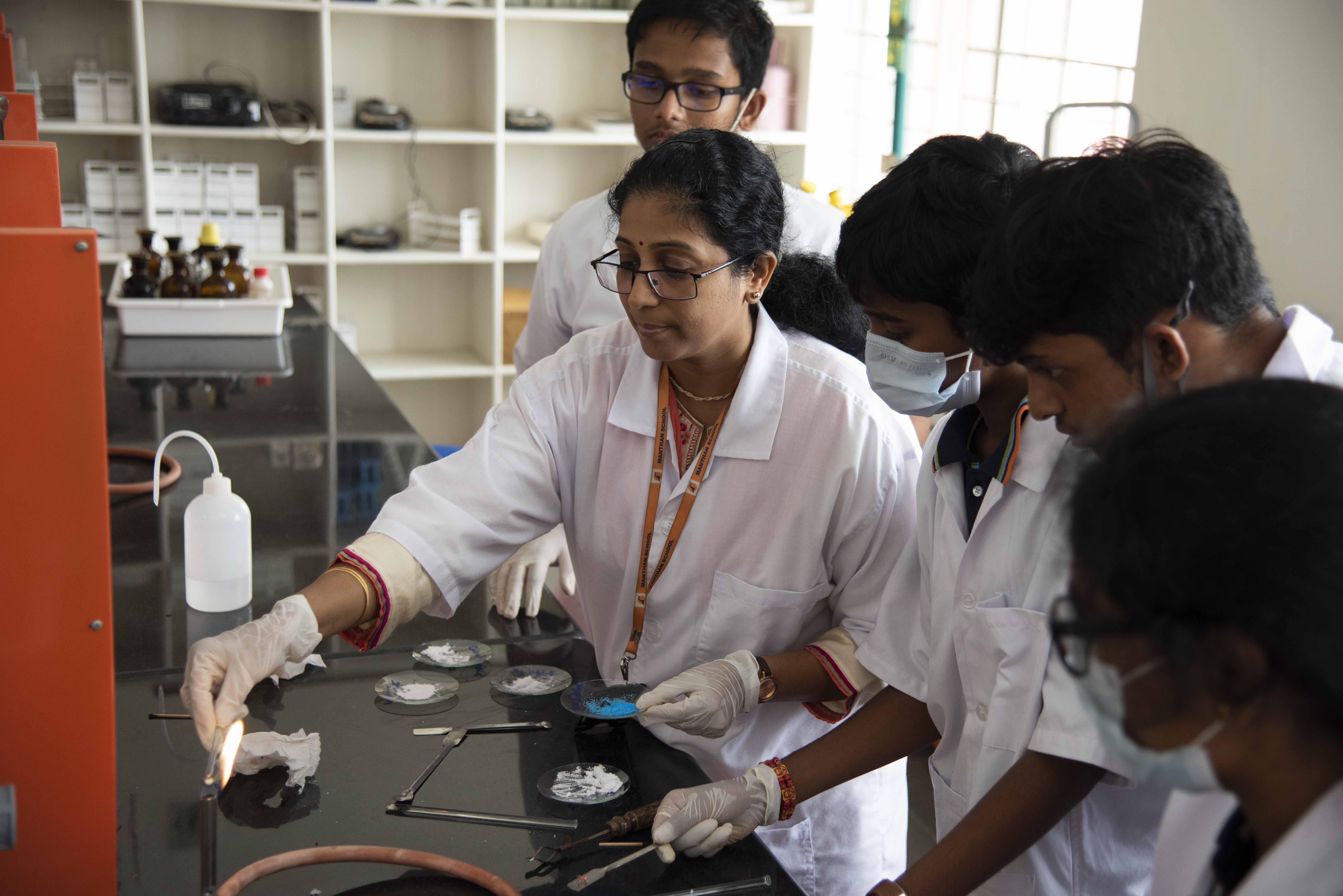

At Manthan, the English language curriculum is planned and tailored for the learners, strictly adhering to the guidelines and recommendations made by the Cambridge International Education.
We focus primarily on developing four core language skills: Reading, Writing, Speaking and Listening.
These language skills are introduced, developed, and reinforced at varied learning stages through a systematic, intensive, and well-investigated approach.
In the primary stages, learners read for fun and phonic awareness. As they progress, they read for explicit and implicit meaning. Students also learn skimming, scanning, and extensive reading techniques. They decode text and explore how linguistic features interact with readers to convey meaning and create the desired effect by the writer.
 1 (1) 1~6c96.jpg)
Our Curriculum Development team and teachers design an array of activities and games to support learning in the classroom. For instance, to help learners remember the characters in a play, teachers use stick puppets or games like hot seating.
Constant remedial support is offered to learners to match them to the standard skill sets. Learning gaps are identified through specialised assessments, which are followed by necessary one-on-one interactions or written guidance.
Our literary carnival 'Literati' lines up an array of events such as story writing, poem writing, extempore, debate, declamation, monologues, spelling bee, drama, comedy nights, and further extend to media skills like photo stories and documentary making, to give them a fine exposure and insight into how language works in real life.
Additionally, 'Sparsh', our school magazine, is another medium where learners get an opportunity to publish their creative expressions and share their views.
Learners are trained to write various fiction and non-fiction text forms such as short stories, poems, blogs, voiceovers, leaflets, travelogues, and chapter books. As they reach middle school, students begin to plan their texts, write in drafts, reflect on their writings, and edit their expressions. High school students learn to write essays and opinion texts. They also analyse their written expressions and other texts.
Students engage in multiple speaking and listening opportunities in the early stages. They begin engaging in recitations, storytelling, and presentations. As students progress to higher stages, they learn complex skills such as dramatisation, chat show simulation, news reporting, podcast making and compering, voiceovers for documentaries, debating, and giving feedback to peers.
We adopt strategies in our lessons to accommodate varied learner levels, be it kinaesthetic, visual, or auditory.
We place a strong emphasis on principles, patterns, systems, functions, and relationships so that students can demonstrate their mathematical proficiency and gain a comprehensive understanding of the subject. We use a variety of teaching methods to help students grasp concepts, engage with the material, and develop mathematical skills that will be useful to them in daily life. Our assessments evaluate students' abilities, knowledge, and comprehension.
We follow the CPA and 5E learning models. CPA stands for Concrete, Pictorial and Abstract. In the Concrete stage, the teacher begins instruction by modelling each mathematical concept with concrete materials (e.g. chips, cubes, blocks, fraction bars etc.). In the Pictorial stage, the teacher transforms the concrete model into a representational (pictorial) level, which may involve drawing pictures; using circles, dots, bars, a number line, etc. The Abstract stage uses abstract symbols to model problems. At this stage, the teacher helps to develop the mathematical concept at a symbolic level, using numbers, notations, and mathematical symbols to represent the number algorithm. We apply the 5E model in our teaching process, which is constructivist and includes five stages: engage, explore, explain, extend, and evaluate.

Our approach is entirely based on inquiry, research and activities. Several math lab resources, like geoboard, integer counters, algebra tiles, etc., are used by students to prove the properties of 2D shapes, solve linear equations, or practice operations in integers. Activities aid in concept clarity and facilitate the active participation of kinaesthetic learners, making it an enriching and enjoyable learning experience for all.

Learning a new language in the early years is crucial. It is a valuable tool for enhancing a child's brain development, improving their memory, speech, and sensory processing. During our 40-minute classes, we utilise various strategies and tools, such as audio-visual media, board games, and activities like treasure hunts, recitation sessions, role-play, storytelling, and word walls, to keep learners engaged and interested.
Our second language curriculum is divided into five segments, each following a different teaching module. Based on Bloom's Taxonomy, we progress from lower to higher-order skills, from knowledge and understanding to creative skills. In the early years, the focus is on recognising and forming letters, reading and spelling words correctly. As learners advance to the next stage, the complexity of skills increases.
Grade 1: We introduce the new language in the form of the alphabet and small words to develop vocabulary. This creates a strong foundation for recognising and understanding the language.
Grade 2: The focus shifts to developing the four core language skills – listening, speaking, reading and writing.
Grades 3-5: Language skills are developed to encourage learners to become independent readers, writers, and speakers.
Grades 6-8: Learners explore additional language resources such as library books and other reading materials to develop proficiency.
 1~ff27.jpg)
Grades 9-12: Learners are encouraged to explore their creative skills in speaking and writing. Speaking skills are enhanced through activities such as debates, plays, etc. Writing skills are honed through composing essays, writing poems and short stories.
Grammar is taught through different prose and poetry units. There is always a lot of scope for creativity, and all our learners are continually budding with new ideas. Their ideas are channelled through various creative platforms such as Language Week or the school magazine.
~a091.jpg)
We account for the fact that learners join at different stages from different parts of the world and do not have any previous exposure to a second language. For such learners, we begin their classes with the Stage 1 curriculum and try to bring them to their respective stages within a year. We focus a lot on basics, appropriate pronunciation and writing of letters, and in turn, words and sentences.
We adopt the "Spiral Curriculum" approach, which involves repeatedly introducing key concepts with increasing complexity over time. This supports a continuous learning process that builds on current and past knowledge.
We design activities to spark students' curiosity which is followed by classroom discussions. Students are encouraged to share information gathered during the exercise and analyse it in a structured manner to meet the topic's learning objectives.

Hands-on activities and lab experiments are used to help students understand scientific phenomena. They are trained to identify variables, make predictions, and present their understanding through models and group projects. Subject-specific teachers use learner-centred methods, such as individual activities and flipped learning, to clear misconceptions and guide students as needed.
Students are encouraged to participate in class discussions and peer learning. Teachers assign various tasks for students to ask questions and clear peer learners’ doubts. They are also involved in conducting fairs to showcase their learning.
Manthan follows best practices to enhance the learning experience, such as:

Social Studies is taught as a skills-based subject that focuses on improving students' research, analytical, evaluative, and collaborative skills with each topic and grade level. Students conduct research, analyse world events, and present their findings in class.
In Grade 3, learners study their local area including the state of their residence, its physical characteristics, demographics, culture, and history. They work in groups and present their understanding through charts, posters, and hoardings. In Grade 4, they learn about Indian history and its rich culture.
 1 (1) 1~dbc1.jpg)
Students study the demography and geography of different nations and contrast them with India. They learn to initiate topics, analyse their backgrounds, formulate questions, and gather information through various phases of the research process. This approach positively impacts retention and topic comprehension.
Students engage in deeper conceptual examination and use their training over the years to excel in various disciplines through case studies, discussions, and debates. Every Social Studies activity is designed to encourage students to think critically, analyse, and assess information before reaching a conclusion.
Discussions and debates are highly valued as evidence of student learning. Classes are structured to allow students to express their views, build knowledge, and become confident speakers.
 1 (1) 1~917a.jpg)
At Manthan, we develop transferable skills within the curriculum framework to help learners become proficient in a foreign language. These skills allow learners to understand and communicate in everyday situations in non-native languages, such as French.
Students are introduced to vocabulary through gestures and contextualised plays, which helps them to learn the words and how to use them. This approach stimulates their imagination and creativity.
~3fe6.jpg)
Teachers introduce new grammar points so that students can understand the structure and formation before receiving an explanation. Students are encouraged to develop independent learning techniques to aid their memory.
Role play is often done in class to get students to speak a non-native language. This allows them to communicate in French using the relevant vocabulary and convey their feelings, ideas and thoughts.
We use listening and reading activities to model good language. Songs and music are valuable resources and can be applied in teaching any aspect of a language. Singing also acts as an aid to correct pronunciation. It provides a great deal of repetition of sound patterns through the lyrics and also fixes the words and patterns in the mind of the learners.
Students have many opportunities to practice speaking - a) in structured environments led by teachers and b) through free communication with other students, which allows them to repeat and recycle the language as much as possible. They receive immediate feedback in class to note any extra information they need to improve their skills.
A gradual approach to teaching non-native languages enables students to acquire essential linguistic skills necessary for further studies or employment.

Lorem ipsum dolor sit amet, consectetur adipiscing elit ut aliquam, purus sit amet luctus venenatis, lectus magna fringilla urna, porttitor rhoncus dolor purus non enim praesent elementum facilisis leo, vel fringilla est ullamcorper eget nulla facilisi etiam dignissim diam quis enim lobortis scelerisque fermentum dui faucibus in ornare quam viverra orci sagittis eu volutpat odio facilisis mauris sit amet massa vitae tortor condimentum lacinia quis vel eros donec ac odio tempor orci dapibus ultrices in iaculis nunc sed augue lacus Lorem ipsum dolor sit amet, consectetur adipiscing elit ut aliquam, purus sit amet luctus venenatis, lectus magna fringilla urna, porttitor rhoncus dolor purus non enim praesent elementum facilisis leo, vel fringilla est ullamcorper eget nulla facilisi etiam dignissim diam quis enim lobortis scelerisque fermentum dui faucibus in ornare quam viverra orci sagittis eu volutpat odio facilisis mauris sit amet massa vitae tortor condimentum lacinia quis vel eros donec ac odio tempor orci dapibus ultrices in iaculis nunc sed augue lacus.